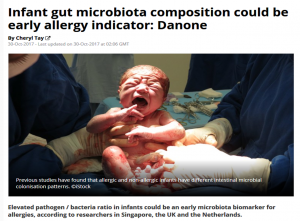Previous studies have reported that allergic and non-allergic infants have different intestinal microbial colonisation patterns. However, the microbial signature underlying the pathogenesis of allergies remains unclear.
The HUBBLE study sought to identify potential microbiota biomarkers of allergies via a case-control study of a Chinese sub-cohort within GUSTO (Growing Up in Singapore Towards Healthy Outcomes), the Singapore’s largest and most comprehensive birth cohort study.
It was found that the intestine of healthy infants was colonised by a greater abundance of commensal Bifidobacterium. Conversely, an opportunistic pathogen called Klebsiella was significantly higher in the allergic infants.
The study demonstrated, for the first time, the correlation of the Klebsiella/Bifidobacterium (K/B) ratio and the risk of developing early childhood allergy.
“Our study postulates that an elevated K/B ratio in early infancy could be a potential indicator of an increased risk of allergy development,” said Dr. Christophe Lay, Adjunct Assistant Professor of Paediatrics Department in National University of Singapore. “This line of research might enable future intervention strategies in early life to prevent or treat allergy,” he added.
The study involved researchers from Singapore (Danone Research & Innovation Singapore, A*STAR, National University of Singapore, KK Women’s and Children’s Hospital), the UK (University of Southampton), and the Netherlands (Danone Research & Innovation, University of Groningen, Wageningen University).
For more details on the HUBBLE study, please read the full text of the paper.
Read about this study in the article “Infant gut microbiota composition could be an early allergy indicator” by NutraIngredients:
